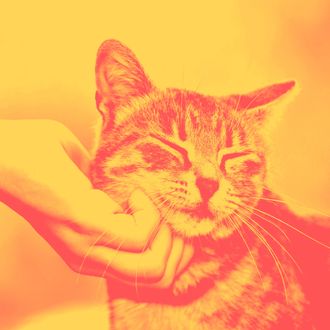
There is an insidious rumor floating about the internet this week. I am speaking of the news reports claiming that dogs love their humans ”five times more” than cats do. The figure comes from an upcoming BBC documentary called Cats v. Dogs, in which the neuroscientist Paul Zak tested the oxytocin levels of pet dogs and cats before and after they played with their owners in a laboratory. Dogs, he found, secreted higher levels of what’s often (misleadingly) called the “love hormone”; therefore, dogs love their people more than cats love their people.
Except that’s not how this works. That is not how any of this works. For one, though oxytocin has long been colloquially known as the love hormone, recent research is showing it’s not as simple as that. Oxytocin has indeed been associated with increased trust and social bonding, but its presence doesn’t necessarily signal positive things. The hormone, for instance, has been found at increased levels not only in women in happy, healthy relationships, but also in women who are in unhappier unions, according to research led by University of California, Los Angeles, psychologist Shelley E. Taylor. “People got carried away with the idea of the cuddle hormone,” she told the American Psychological Association in 2011. “It’s never a good idea to map a psychological profile onto a hormone; they don’t have psychological profiles.”
But back to the cats. The differences in the levels of oxytocin found in the dogs and the cats was more likely influenced by the stress of the laboratory setting than anything to do with love for their owner, John Bradshaw, a University of Bristol scientist who studies animal behavior, told Science of Us. “[W]e know that cats, being territorial animals, usually react badly to being taken out of their regular environment,” said Bradshaw, who is also the author of two popular-press books on animal behavior: 2011’s Dog Sense and 2013’s Cat Sense. “Dogs on the other hand, usually stay relaxed provided their owners are there.”
Bradshaw added:
Frankly, I’m surprised that any of the cats’ oxytocin levels went up, because they would have been stressed by the setting. Even the increase that was seen says nothing about how much cats “love us” by comparison with dogs — but it does tend to confirm that cats need to be in their comfort zone to express their affection.
So maybe dogs really do love their owners more, and maybe they don’t — this oxytocin experiment doesn’t really tell us much about that, one way or the other. One thing that does, however, seem apparent: Zak, and the others involved in the BBC program, are clearly dog people.

